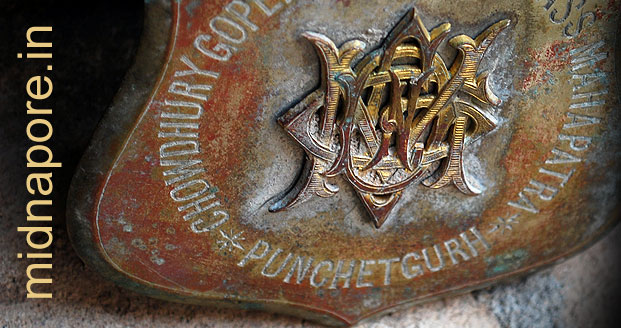Puttaspore pergunnah up to 1803 A.D. was a Mahratta mehal, and was ceded with Orissa. The greater portion was then in the hands of Reneka Deya Chowdrain. This portion was held khas till 1806 A.D. It was then transferred to the Hidgillee Collectorate; and a 5 years' settlement was made with the Chowdrain. She subsequently adopted Kisto Mohun Chowdry, and died while he was a minor. A 5 years' settlement was made with the Chowdrain. She subsequently adopted Kisto Mohun Chowdry, and died while he was a minor. A 5 years' settlement was made with Jussodanund Chowdry, the father of Kisto Mohun Chowdry in the name, however of the minor, that father having been all along the Naib of the property. The father and settlement expired nearly together; and Rughoonundun Dass, the minor's elder brother, was appointed manager and a 3 years' settlement was made with him. The minor, Kisto Mohun having attained his majority in 1820 A.D., periodical settlements were made with him; one of which bearing a heavier assessment then he would accept, it was farmed to one Russicklall Dutt for 3 years; subsequently Kishen mohun Chowdry accepted the jummah which he had refused before.
 |
|
 |
In 1825 A.D. this pergunnah was retransferred to the Midnapore Collectorate. From 1833 A.D. to 1836 A.D. a detailed statement under Regulations VII of 1822 was made. It was measured by Mr. D'Oyly, and completed by Deputy Collector Anund Chunder Mitter. In 1837 A.D. Kishen Mohun refused to this new settlement; and the property was made khas. When so khas, the assessment was again revised by the same Deputy Collector. In 1839 A.D. Kishen Mohun Chowdry accepted the revised settlement (the whole of which was most carefully and ably conducted by the Deputy Collector). Kishen Mohun Chowdry died in 1845 A.D., leaving two adopted sons, one of whom died and the other survives; and is the present minor and ward of the Collector *** (see WARDS). This pergunnah produces sugarcane (partially), oilseeds, some little mulberry, spring as well as autumn rice and tobaccos. There is a Mussulman Madrassa in this pergunnah, to which an allowance of 52 maunds of salt per annum and 1 rupee a day for the equipage of the Mutwallee and 2,000 beegahs of land were assigned by the Marhatta Government. The endowment was confirmed; but although 40 pupils are borne on the rolls the establishment is ill managed and requires gradual reform.
*** WARDS - Gopalpoor or Puttaspoor:- This ward is a shrewd boy of 17, fond of money, reads and writes English, and is attentive in school. His guardian is his uncle, an able man (Bhola Nath Doss), who has done justice to his ward under very difficult circumstances. The adoption of this of this minor was resisted by the widow of the last proprietor, Kissenmohun Chowdry; and lattenly (this year) she attempted to set it aside by a suit in Court, but was cast. Her main pleas were that all the ceremonies were not properly performed at the original adoption, and that adoption was afterwards on his death set aside by Kissenmohun in her favour by then investing her with the teeka of succession. The first plea was not supported in any way by the evidence and the second not sufficiently.
There is no doubt that Kissenmohun Chowdry made the adoption fully and freely when in full possession of his faculties; and that long before his death illness had rendered those faculties very much impaired, if they were not indeed altogether gone. And that if anyone ever had occasion not to show any marks of affection for the widow he had; her conduct during his life time being notorious and a source of great distress to her husband. This minor has Rs. 61,892 in company's paper. There is some intention; it is said, of expelling from the English school those boys who are not promoted in 2 years. This rule would affect both Soojamooth and Puttaspoor, who have not been promoted (though to me as one of the general examiners, they appeared as deserving it). This disgrace will be severely felt by the Rajah of Pottaspoor, who is in the point of attaining his majority, and it will be better to withdraw him at any rate (if not both), substituting a private tutor. Both boys have expressed a wish to attend the English office of the Collectorate to lean business, and this should be encouraged; now and then the collector might let them attend in his office, especially when he acts judicially under Regulation VII of 1799 and section 30, Regulation II of 1819.
|

